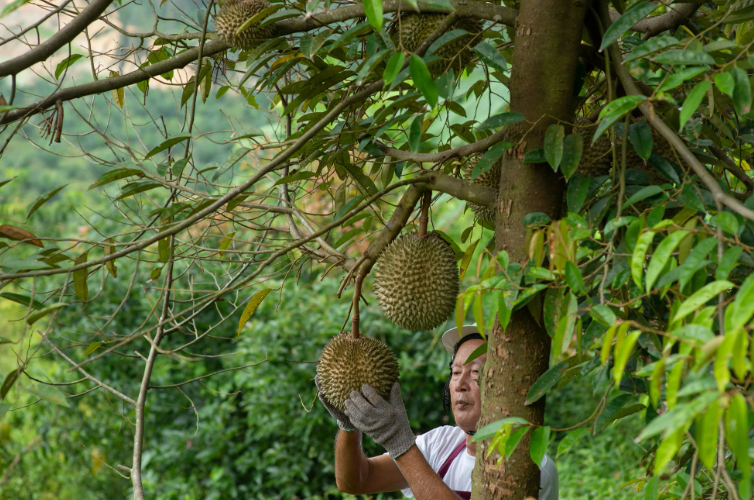May 31, 2025 | 04:10 GMT +7
May 31, 2025 | 04:10 GMT +7
Hotline: 0913.378.918
May 31, 2025 | 04:10 GMT +7
Hotline: 0913.378.918

Instead of waiting for durian to ripen and fall from the trees, some Malaysian durian farmers harvest them when they are just about to ripen. Photo: Getty Images/iStock
Deputy Agriculture and Food Security Minister Chan Foong Hin said Thai durian purchasers came to Raub to harvest the king of fruits from the trees at higher prices, which he claimed were subsequently sold to China as fresh fruit under the label “Thai Musang King”, possibly hindering future exports of high-quality Malaysian durian to China.
“This is a free market, I do not stop you, but I don’t encourage [it],” he said, adding that the ministry will raise the issue with the Thai embassy in Malaysia, particularly whether Thai durian buyers subsequently were selling Malaysian durian as “Thai Musang King” in China.
He said the ministry had called on durian farmers and exporters to look into the matter.
“We must use proper trade channels for exporting durian to ensure that local farmers do not lose out in the long run and protect the reputation and brand name of Musang King from being exploited by other markets,” he said in an interview. Chan said Malaysian Quarantine Inspection Services (Maqis) will collect the data.
He said the ministry has worked on and facilitated in obtaining approval for exporting fresh durian fruits to China.
“I also understand the farmers’ desperation to develop more sales channels, including the possibility of exporting fresh durian directly to China, but the ministry is concerned with Malaysia’s national interest,” he said.
He said the Musang King durian in Malaysia are ripe before falling from the trees and frozen in liquid nitrogen before being sent to China. Simultaneously, some durian export fruits are plucked before they are ready for export.
He stressed that “durian that ripen on the tree” are the Musang King’s selling point.
He reminded farmers that Singapore is the country that imports the most durian from Malaysia.
They should not jeopardise the quality and reputation of the durian built up over time for short-term gains, he added.
Based on the Department of Agriculture records until May, as many as 44 frozen durian processing facilities have received export approval from the General Administration of Customs of the People’s Republic of China.
A total of 41 facilities are processing durian in the form of pulp and paste.
In addition, 20 are approved for exporting whole fruit.
Local traders currently pay 30 ringgit (US$6.55) per kg for Grade “A” Musang King, while Thai buyers pay 34 ringgit (US$7.43) per kg.
It is learned that instead of waiting for durian to ripen and fall from the trees, Raub’s durian farmers harvest them when they are just about to ripen.
Many durian farmers purportedly see the trend as a breakthrough for owners to break away from local traders.
Raub Crop Producers Association president Nicky Koh said that Thai buyers were willing to pay higher prices for durian, which the farmers see as another way to expand the market.
He said the farmers have yet to learn what the Thai buyers do with the Musang King durian once it has been bought and shipped back to Thailand, or if they are labelling it as “Thai Musang King” durian, and if there is anything they can do to stop it.
He said only the frozen Malaysian Musang King durian could be exported to China, and exporters must be concerned about the shortage of liquid nitrogen gas.
Koh also said that early harvesting of durian brings higher prices than natural ripening, saving on labour costs, having longer shelf life, and solving marketing, price and cost issues.
He said plucking the durian before it totally ripens will not affect its taste.
Meanwhile, Malaysian Durian Planters Association president Dr Tan Sue Sian explained that the flesh naturally ferments in its husks, which begins as soon as the durian falls from the tree.
The fermentation process impacts how durian finally taste, with lengthier fermentation resulting in stronger flavours.
He said that early durian plucking necessitates calculating days and time and packing to export to China, which can influence the quality delivered by Thai exporters unfamiliar with the Malaysian Musang King durian.
(SCMP)

(VAN) Vikas Rambal has quietly built a $5 billion business empire in manufacturing, property and solar, and catapulted onto the Rich List.

(VAN) Available cropland now at less than five percent, according to latest geospatial assessment from FAO and UNOSAT.

(VAN) Alt Carbon has raised $12 million in a seed round as it plans to scale its carbon dioxide removal work in the South Asian nation.

(VAN) Attempts to bring down the price of the Japanese staple have had little effect amid a cost-of-living crisis.

(VAN) Fourth most important food crop in peril as Latin America and Caribbean suffer from slow-onset climate disaster.

(VAN) Shifting market dynamics and the noise around new legislation has propelled Trouw Nutrition’s research around early life nutrition in poultry. Today, it continues to be a key area of research.

(VAN) India is concerned about its food security and the livelihoods of its farmers if more US food imports are allowed.